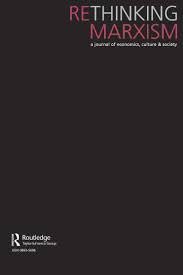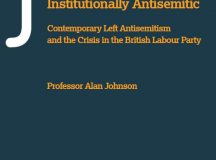‘A totalising perspective that can grasp the [Israeli] violence as an expression of the capitalist world… an analysis [which] has the potential to open new avenues of thought and action rather than keeping us locked within paradigms that may block critical thought…a return to Marxist theorising of Palestine-Israel [which] has the potential to produce insights that cut against the grain of what exists.’
These are just some of the promises of last year’s special issue of the American magazine ‘Rethinking Marxism’, given over in its entirety to Palestine-Israel. Continuing in the same vein, the magazine likewise promised to ‘unsettle the positions on Palestine-Israel to which we on the left are accustomed’, encourage its readers to ‘abandon those older positions that were once at the core of this project’, ‘revitalise our thinking about Palestine-Israel’ and contribute to ‘the shape of some global Marxism to come.’
The promises though, came with a caveat: ‘Each essay offers one such new interpretation. Hence, the pieces are eclectic, in terms of both their disciplinary fields and theoretical commitments. This is intentional. The reader will find no fully elaborated political agenda or conceptual system.’ Sad to say, the magazine achieved the caveat but not the promises.
Fredric Jameson’s preface sets the scene for the essays and articles which follow. ‘Defeat of Israel’ has come to seem ‘unthinkable’. The ‘old-fashioned pipe dream’ of a two-state solution now seems like ‘yesterday’s fantasy’. In a globalised world ‘the older nation-state categories’ lack consistency. Leftist politics has largely been reduced to ‘the classic bourgeois concepts of civil rights and human rights.’ The international Left ‘of whatever persuasion’ has been mistaken in giving priority to ‘national liberation’ over class struggle.
But ‘deeper contradictions’ are at play. Palestine-Israel is now the site of ‘a fully-fledged capitalist economy’. It has become ‘something like a pure laboratory experiment in which theoretically to observe the dynamics of the latest stage in world capitalism.’ Israeli and Palestinian workers ‘may not even constitute two distinct national proletariats but versions of that new globalised workforce coming into being in this third stage of capital.’
There has been ‘a near absence of Marxist writing’ on Palestine-Israel, write Oded Nir and Joel Wainwright in their essay, partly they argue, because ‘there are practically no Marxists active in US universities anymore.’ More fundamentally though, it is a result of Marxist analyses such as their’s focusing on ‘the violent colonisation of Palestine and the ethical nature of this process’ rather than on ‘class, relations of production or the relationship between the political and economic balance of forces over time.’ In other words: ‘The Left has framed the conflict in terms of nation and religion – Israeli/Jew versus Palestinian/Muslim – leaving class and capital aside.’
Nir and Wainwright invoke the ‘vanishing mediator paradigm’ (based on the Hegelian ruse of reason, developed by Fredric Jameson, and further elaborated by Slavoj Zizek) to explain the absence of Marxist analysis of Palestine-Israel. In the 1990s ‘the pursuit of peace’ was ‘the vanishing mediator’ which provided a cover for ‘the neo-liberal reforming of Israel and Palestinian society’. Once that neo-liberalisation had been achieved, the ‘pursuit of peace’ mediator vanished, albeit in the form of universalisation: ‘The Marxist position has therefore disappeared not through its abandonment but through the universalisation of one element: peace between two states.’
There are certainly ‘stacks of left-wing books by critics of Israel’ and ‘some brilliant critical analysis of Zionism’. Even the best among those writers however, suffer from the overall malaise of a non-Marxist approach. Their analysis of Palestine-Israel is ‘facile’. They ‘stop short of relating the analysis of political relations to the contradictions of capitalism.’ And, in the case of Israeli post-Zionist writers, they were ‘unintentionally useful champions of neo-liberalism and the dissolution of working-class economic protections.’
‘The inevitable conclusion’ reached by Nir and Wainwright is that ‘we are in dire need of a new Marxist position and a new political project.’ What that might involve is not spelt out. Like the other contributions to the magazine, their article ‘should not be read as a definitive statement of the Marxist approach but as a possible starting point for the elaboration of one.’
An essay by Amir Locker-Biletzki critiques Gershon Shafir’s use of settler colonialism as an analytical framework to understand ‘the Zionist-Palestinian conflict’. The settler-colonialism concept is not wrong per se; what it lacks is an analysis of ‘the role of capitalist class development within colonial political economy.’
Zionist settler colonialism was ‘organically linked to the Western imperial project’ and ‘had no economic use for Palestinians.’ Its logic was separatism – ‘an apartheid of a special type’ which ‘laid the foundation for the ethnically segmented, hierarchical order of present-day Israeli society’. Within that separatist logic however, ‘capitalism was constructed by both Palestinians and Jews’, resulting in ‘the formation of both propertied and labouring classes’. Even though ‘class development was deeply bifurcated along ethno-national lines’, the latter classes engaged in struggles that sometimes had ‘a bi-national anti-colonial (i.e. anti-British) nature’ and contained ‘the possibility of emancipation for both nationalities.’
Shafir’s shortcoming was to allow ‘the coloniser-colonised dichotomy to overshadow that of the proletariat-bourgeoisie.’ Cleavages of class ‘in both the settler and colonised societies’ resulted in social struggles – ‘struggles that at times blur and defy the colonial divide that nationalist establishments wish to reinforce and exploit.’
‘Men of Capital in Mandate Palestine’ is the subject matter of Sherene Saikaly’s article. In the 1930s these men (and some women) of capital looked forward to ‘Palestinian progress in a pan-Arab utopia of free trade, private property, and self-responsibility.’ In doing so, they built upon the economic growth achieved in earlier decades. That ongoing economic growth was seen by its progenitors as part of a broader Arab nahda: ‘That heterogeneous movement wherein the nation was to rise up, discard corrupt and outdated traditions, and realize the triumphant arrival of the modern.’ But the foundations of Palestinian economic growth were destroyed in the Nakba of 1948.
Saikaly’s article does not glorify the ‘Men of Capital’. She describes the social order which they sought as one which ‘contained social mobility, silenced dissent, and stunted the potential for revolutionary change.’ Rather, her goal is to overturn the ‘historiography of settler colonialism in its British and Zionist articulations’ which depicts ‘the colonial body as the agent and the colonised body as its ephemeral shadow’. This is a precondition of ‘accessing and critiquing the debates that have shaped the present.’
More recent developments in the Palestinian economy and their relationship to class formation and the prospects for ‘national liberation’ are the focus of an article by Raja Khalidi.
Over the past twenty-five years there has been a ‘flourishing of capital accumulation, marketisation, privatisation, financialisation, and liberal trade in the West Bank and Gaza.’ This has resulted in ‘the formation of distinct social forces whose material interests … appear less and less dependent on, and concerned with, a successful national liberation.’
The post-Oslo-Accords emergence of ‘deformed neo-colonial governance’ (i.e. the Palestine National Authority) has provided ‘the bourgeoisie, the middle classes and the ruling political elites of the PLO’ with ‘material and power interests’ in the new status quo. But that status quo cannot deliver national liberation and increasingly alienates the PLO’s ‘frustrated and restless mass base’.
Khalidi concludes by asking whether ‘settler colonialism has reached so deep that there is no more nation to liberate in the traditional meaning of the word’ and whether ‘the process of capital accumulation and class formation has reached a stage whereby denial of national self-determination is no longer the primary contradiction for the Palestinian masses.’ His tentative conclusion is that a focus on social and economic issues may offer a better route to ‘national liberation’, although how such an alternative scenario might play out ‘remains a matter for conjecture.’
Research and theorising carried out by Shimshon Bichler and Jonathan Nitzan since the 1980s is the theme of their contribution to the magazine: ‘Arms and Oil in the Middle East – A Biography of Research’.
The article describes the uphill struggle faced by the authors in their endeavours. Nitzan’s master’s thesis was too much for ‘its Canadian Zionist reader [external referee] to stomach.’ As a ‘devout Zionist’ she was also ‘enraged by many of the unpleasant facts cited in the thesis’. Consequently, she failed it. Bichler’s PhD dissertation ‘flabbergasted’ the dissertation committee members because of its ‘unpatriotic econometrics’. They sent the dissertation to an external referee ‘with an explicit instruction to fail it, [but] the referee refused to co-operate and informed Bichler of the plot.’ Attempts by Bichler and Nitzan to have their work published in mainstream journals ‘were repeatedly rejected on equally embarrassing pretexts.’
Bichler and Nitzan’s article deals with the ‘Weapondollar-Petrodollar Coalition’. This is ‘an alliance of armaments firms, oil companies and financial institutions based mostly in the United States.’ The two academics plotted the return on equity of the oil companies in this Coalition – ‘Petro-Core’ – and compared it to the average rate of return on equity of the Fortune 500 companies. Their conclusion: ‘Our work uncovered a new long-term correlation between the differential profitability of the Weapondollar-Petrodollar Coalition and the periodic eruption of Middle East energy conflicts.’
A below-average rate of return on PetroCore equity was followed by war (‘every energy conflict save one was preceded by Petro-Core trailing the average’). And it was war which restored the rate of return (‘every energy conflict was followed by the oil companies beating the average’). In other words: ‘The differential performance of the oil companies depended not on production but on the most extreme form of sabotage: war.’
Today though, this analytical framework is valid ‘only in part’. ‘Since 2014 the synchronized decline of oil prices and earnings has occurred despite ongoing regional conflict and plenty of violence.’ More importantly, the Weapondollar-Petrodollar Coalition now plays second fiddle to the Technodollar Coalition (‘listed technology firms, both hardware and software’). Further decline in the power of the Weapondollar-Petrodollar Coalition could have a positive impact: ‘If the power of this coalition continues to slide, that slide might spell the demise of Israel’s occupation of Palestine and a major shake-up of many of the region’s oligarchies.’
Zionism is dealt with in an article by Nitzan Lebovic: ‘This essay contends that the relationship between political melancholy in Weimar Germany and its repurposing by German Jews for Zionist thought reveals how political melancholy (defined by Lebovic as: a seminal realisation of collective loss that hinders a given group’s ability to effect change) was and remains at the heart of Zionism.’
Among Jews, writes Lebovic, ‘it was common to identify melancholy with the time of the Jewish exile circa 70AD, with the destruction of the Second Temple, and the forced exile.’ The ‘rise of Zionist ideology’ gave this melancholy ‘a distinctly negative tone’. At the same time it held out the promise that ‘the aliyah emigration to Zion – ‘ascending’ – [would] cure the settlers of all historic ills.’ The state of Israel would be ‘the antidote to the vulnerability of Jewish life in exile.’
The moderate Zionist left-wing ‘followed the same melancholic structure as the right-wing of negating exile with a revivalist discourse of the land of Zion.’ The implicit melancholy of the 1948 generation resulted in an ‘institutional revivalist discourse shared by moderate and so-called ‘radical’ left-wing Zionists.’ This, in turn, led to ‘the explicit, militant melancholy of the post-Six-Day-War generation, which, once again, was shared by left-wing melancholiacs.’ Today, the process has gone a stage further, resulting in the loss of melancholy itself for the sake of ‘a fetishised and reactionary celebration of power’ and ‘an unacknowledged incorporation of loss into the structure of the national ego.’
Finally – in this special issue of ‘Rethinking Marxism’ given over to ‘unsettling the positions on Palestine-Israel to which we on the Left are accustomed’ – there is an interview with Noam Chomsky. The views expressed by Chomsky are consistent with what he has had to say over the past half-century, but often not with views expressed elsewhere in the magazine.
Was there a causal connection between the consolidation of neoliberalism and changes in Israel and Palestine? ‘I don’t think there was a significant connection.’ Do you concur with Pappe’s analysis of the need for socialist politics in relation to the peace process? ‘I certainly join him in his critique of neoliberal projects and advocacy of socialist discourse. But I don’t think these are crucial factors in the ‘peace non-process’.’ Couldn’t we draw an analogy between your analysis and the Zionist Young Guard’s positing (in the 1930s) of ‘stages’ to revolution? ‘I don’t think there’s much of an analogy.’
Isn’t the Palestinian bourgeoisie incapable of leadership because it has nothing left to win from the peace process? ‘The Palestinian bourgeoisie could gain considerably by ending the occupation and the internal repression.’ Shouldn’t the debate about one-state or two-states be based upon something other than immediate feasibility? ‘The debate, so formulated, crucially omits a third option: the creation of a Greater Israel…The real choice is between Greater Israel and the international consensus on a two-state settlement.’
‘Where is the Marxist Critique of Israel/Palestine?’ is the title of the article by Nir and Wainwright. One of the many possible answers to this question is: Wherever it might be, it is certainly not in this special issue of ‘Rethinking Marxism’.
The special issue is not an exercise in futility because it fails to provide a definitive Marxist analysis and a programme for Israel-Palestine – an unrealistic criterion by which to judge it, and a goal which its editors do not claim to aspire to. It is a failure on all fronts because it remains trapped in the conventional wisdoms of broad layers of the Left, because its critique of ‘positions to which we on the Left are accustomed’ amounts, at best, to an application of Marxist cosmetics rather than direct confrontation, and because its avowed ‘eclecticism’ is no more than a euphemism for political incoherence and evasion.
The magazine’s articles share a common hostility to a two-state solution. This hostility is not born of new political insights, Marxist or otherwise, but of despair: ‘Experience of defeat has become a way of life’ (Jameson), ‘the liberal-reconciliatory agenda has lost all political effectiveness’ (Nir and Wainwright), ‘[denial of] national rights for Palestine appears an irresistible and assured process … [it is] a lost national struggle’ (Khalidi); ‘the conflict between Israelis and Palestinians originating in late-nineteenth-century Zionism stands at a bloody impasse’ (Locker-Biletzki).
Jameson, as already noted, dismisses a two state solution as an ‘old-fashioned pipe-dream’ which now seems like ‘yesterday’s fantasy’. According to Nir and Wainwright: ‘Even if this position was once valid, the territorial basis for a Palestinian state has been systematically destroyed…To chant demands for a Palestinian state reflects either bad faith or a hypocritical false optimism.’ Khalidi likewise writes that a ‘diehard belief in the necessity and inevitability of the two state solution has been, at best, misplaced and, at worst, deceptive toward the Palestinian people’s interests.’
For Bichler and Nitzan the call for two states is a Jekyll and Hyde cover for neo-liberalism: ‘During the day these economists worked in the service of capital, advising governments, consulting corporations, and preaching the wonders of perfect competition and the evils of government intervention. At night, though, they marched the streets and gave speeches, calling on their government to end the occupation and give the Palestinians their own state.’
Khalidi goes a lot further. He is uncritical, if not supportive, of historic alternative ‘solutions’:
‘The goals of national liberation and independence were to be realized [by the PLO] in a single State of Palestine for Palestinian Arabs, including only pre-1917 Jewish communities. This formulation of Palestinian nationhood effectively negated the Jewish claim to national self-determination and the legitimacy of the existence of a State of Israel or an Israeli people.’
‘By the early 1970s, a savvy and more progressive Fatah leadership, aware of regional and global realities and concerned with their public image, redefined the envisaged post-liberation Palestinian state as being non-sectarian and democratic, implicitly acknowledging equal cultural, political, and civil rights for Muslims, Christians, and Jews. This model was, for that moment in history, an appropriate concept to which bourgeois patriots, socialists, and Arab nationalists, as well as international supporters, could all adhere.’
Khalidi either does not understand or does not care that that ‘this model’ was simply the negation of Jewish national self-determination in another form. It was certainly more ‘savvy’, but it was not ‘more progressive’.)
Rejection of a two-state solution is the common property of broad layers of the Left in both the USA and Britain (and elsewhere). The dismissal of it by ‘Rethinking Marxism’ therefore, singularly fails to ‘cut against the grain of what exists’ and ‘unsettle the positions on Palestine-Israel to which we on the Left are accustomed.’ On the contrary, it provides an endorsement.
Nor does rejection of a two-state solution help ‘revitalise our thinking about Palestine-Israel’. The standard Left alternative to a two-state solution is a ‘one-state solution’. (What else could it be?) The inadequacies of such a ‘solution’ are well rehearsed and do not need to be repeated here. In any case, they are to be found in the pages of ‘Rethinking Marxism’ in the interview with Chomsky: ‘Calling for one state now is pretty much an empty gesture. If meaningful support ever developed, Israel would surely use all the means at its disposal — and they are ominous — to refuse to go out of existence in favour of a state with a Jewish minority.’
The rejection of the possibility of a two-state solution is the trigger for the magazine’s promise of rethinking: ‘Recognizing the absence of a two-state solution, we contend, should compel us to rethink Israel/Palestine though categories that cut across national lines’. But the rethinking, insofar as the magazine contains anything worthy of the name, is a particularly timid affair, and one which leaves intact ‘the positions on Palestine-Israel to which we on the Left are accustomed.’
‘Rethinking’ the orthodox-left conceptualisation of Israel as a settler-colonial state (and therefore illegitimate, and therefore unworthy of existence – in contrast to all other historically settler-colonial states) does not go beyond some minor tinkering at the edges. Again, this ‘rethinking’ amounts to a (critical) endorsement of ‘a position on Palestine-Israel to which we on the Left are accustomed.’
The magazine ‘seeks to rectify’ this conceptualisation (Jameson). Israel is ‘to be sure, a settler-colonial state, yet recognising this is insufficient for grasping the valences of the present conflict’ (Nir and Wainwright). ‘It is not my aim to debunk settler colonialism as a way to frame the history of Palestine-Israel…This essay acknowledges the value and validity of the settler-colonialism concept…and attempts to reconnect the identification of Zionism and colonialism to their roots in anti-Zionist Marxism’ (Locker-Biletzki).
Even this modest re-tinkering and appeal to think in ‘categories that cut across national lines’ does not seem to be shared by all the magazine’s contributors. Bichler and Nitzan define ‘the true roots of the conflict’ as ‘a foundational clash between the Zionist project and the indigenous Palestinian population.’ Khalidi likewise refers to ‘a century of confrontation with Zionist settler colonialism’ and ‘the contradiction between the Palestinian nation and the Israeli settler colony’.
Despite the promise to free its readers from ‘paradigms that may block critical thought’, the magazine also fails to challenge the conventional-left essentialisation and demonisation of Zionism (unlike any other nationalism: uniquely reactionary, necessarily racist and expansionist, and inherently prone to collaboration with fascism). Insofar as Zionism is mentioned in articles in the magazine, it carries, implicitly or explicitly, all the negative connotations traditionally associated with it by much of the Left.
Nir and Wainwright write that ‘attentiveness to particularity requires historicising Zionism anew’. They go on to refer to Zionism as ‘a utopian politics aiming for the liberation of a subaltern transnational proletariat through the formation of a new society…a failed project of national liberation.’ This is however not developed further and it is certainly not counter-posed to their conceptualisation of ‘the Zionist project’ as a form of settler colonialism. They describe Zionism as having been ‘realised’ in the form of ‘the colonisation of Palestine’, and Zionists as having ‘the status of self-deluded watchdogs for the British Empire’ in Mandate Palestine.
The writers they cite as being responsible for ‘some brilliant critical analysis of Zionism’ further underline how far removed they are from challenging the standard depiction on the Left, of Zionism.
Writers cited include: Jacqueline Rose (Zionism is a collective mental condition resulting from centuries of persecution), Judith Butler (Hamas and Hizbollah are part of the global Left), Ilan Pappe (Israel is like South Africa and should therefore be boycotted, with the exception of academics who oppose government policy), Moshe Machover (Zionism had an area of basic agreement with the Nazis), and Shlomo Sand (Jews are descendants of Russian Khazars, are not a people, and have no claim to territory in the Middle East).
John Mearsheimer and Stephen Walt are also included in this cum laude list of authors of ‘brilliant critical analysis of Zionism’. Nir and Wainwright explain their inclusion: ‘Their book is not Marxist [nor is it post-Zionist]; indeed, they are anti-Marxists, and yet we should rightly celebrate their contributions to the critique of Zionism’. The book in question is ‘The Israel Lobby and US Foreign Policy’, which bought into various antisemitic tropes.
Lebovic’s essay ‘The History of Political Melancholy as an Alternative History of Zionism’ (a condensed version of his book ‘Zionism and Melancholy’ published in January of this year) might appear to be an attempt at ‘historicising Zionism anew’. In fact, it has much in common with Jacqueline Rose’s work of well over a decade ago: ‘Question of Zion’.
Borrowing a term from Robert Esposito, Lebovic writes that ‘a negation of exile and a revivalist mode became melancholy’s modus vivendi, a symptom of ‘the sickness of the political body.’’ This now expresses itself in the ‘fetishised and reactionary celebration of power’ which belongs to ‘the structure of the national ego’. Although Lebovic employs different categories from Rose, his ‘alternative history’ is not far removed from Rose’s earlier portrayal of Zionism as an irrational messianism, a kind of mental disorder in which the internalised violence of centuries of Jewish suffering now externalises itself in the dispossession and oppression of the Palestinians.
In fact, Lebovic finds Rose too moderate. He invokes Judith Butler in order to take Rose to task for her ‘nostalgia for cultural Zionism’. Butler though, also turns out to be too moderate. Lebovic endorses Larisa Reznik’s criticisms: ‘She [Butler] offers no site of institutional inscription for her ethics’, especially in relation to ‘the melancholy that keeps Jews attached…to a narration that keeps Jews unable to admit to that loss and thus to make the negativity productive – a space for imagining a future rather than constant recurrence to a now fetishised violence and subordination of the past.’
A further dimension of the magazine’s failure to deliver on its promise to encourage readers to ‘abandon older positions’ is the evasion of an engagement with core elements of much contemporary mainstream-left thinking on Palestine-Israel. Of course, there are limits to what can be covered in half a dozen articles and an interview, but a number of themes are noticeable for their absence.
There is no discussion, nor even mention, of left-wing antisemitism and its various manifestations – the negative essentialisation of Zionism, the canards of Zionist-Nazi collaboration and Zionist involvement in the Holocaust, the attempted delegitimisation of the existence of the state of Israel, the incorporation of traditional antisemitic stereotypes and tropes into a nominally Left discourse, ways of thinking about Jews, Zionism and Israel which conflict with most Jews’ sense of identity, and the defence of antisemitism itself through counter-accusations of ‘bad faith’ (the ‘Livingstone Formula’).
Continuing in the same vein, there is no discussion of the official state-run antisemitic campaigns in the Stalinist states in the immediate post-war years and in the aftermath of the Six-Day War, and of how those campaigns fed first into the Palestine-Israel politics of Communist Parties in Europe and the Americas and then into a broader Left milieu. But rooting out those continuing influences must surely count as a precondition of ‘a return to Marxist theorising of Palestine-Israel’.
Insofar as mention is made of Stalinist states and movements, some ‘rethinking’ would not go amiss. In the South African struggle against apartheid ‘an alternative to capitalism was nominally present through Cuban support for the African National Congress’s struggle’ (Nir and Wainwright). ‘The new Fatah leaders established relations with several socialist countries, including both the Soviet Union and China, as well as with a growing number of Third World national-liberation movements, socialist and otherwise’ (Khalidi). ‘This concept [first secure the nation, then launch the social revolution] framed the liberationist strategies of Castro and Guevara in Latin America, the FLN in Algeria, and the Vietcong and other socialist movements in Asia’ (Khalidi).
While the magazine provides a relatively substantial analysis of the evolution of the PLO and Fatah, there is no equivalent analysis of the emergence and evolution of Hamas and its implications for a Marxist analysis and programme for Palestine-Israel. On the one occasion when Hamas is mentioned, it is defined as ‘a Palestinian Islamist national-liberation movement bonded by faith and tradition’ and ‘a national front of a greener colour, perhaps, but [which] nevertheless comports with the tradition of the secular national movement.’
There is likewise no discussion of the politics which underpins the demand for BDS (Boycott, Disinvestment and Sanctions) and of its effectiveness, or otherwise, as a campaigning tactic. The sole reference to BDS is to be found in the interview with Chomsky (who rejects a blanket boycott and is particularly critical of an academic boycott, whilst supporting targetted boycotts).
Something more fundamental however, is absent from this special issue of ‘Rethinking Marxism’: There is scarcely anything Marxist about its contents and contributors.
Bichler and Nitzan are an exception: they are overtly anti-Marxist. Their CasP triangle (Capital as Power – ‘capitalised power, dominant capital, and differential accumulation’) which underpins their analysis of energy conflicts is based on a rejection of the labour theory of value and other basic Marxist concepts (class struggle, modes of production, exploitation, working class as agent of revolutionary change, etc.)
Nir and Wainwright attempt to explain away the contributors’ lack of Marxist affiliations with the argument: ‘Are the essays entirely Marxist? To that we answer with Fredric Jameson’s assertion that ‘Marxism is not a philosophy at all’ in the customary sense. Rather…it can be identified by allegiance to a specific complex of problems, whose formulations are always in movement and in historic rearrangement and restructuration, along with their object of study [capitalism itself].’
This is an adequate explanation for the ‘eclectic’ nature of the magazine’s contents. But it is not an adequate defence against the ‘charge’ that Marxism is largely absent from the magazine’s pages. Still less does it justify the magazine’s claims to be laying the groundwork for ‘a return to Marxist theorising of Palestine-Israel’ and to be providing ‘strategic lessons for the forms that resistance can take today and the shape of some global Marxism to come.’
The narrow focus of Seikaly’s article means that she does not address these issues at all. Bichler and Nitzan see ‘the demise of Israel’s occupation of Palestine, ’being triggered by the decline of the Weapondollar-Petrodollar Coalition as ‘dominant capital’. Khalidi looks forward to some kind of ‘broader struggle to mobilize the Palestinian people – including compatriots who are citizens of Israel’ but anything beyond that ‘remains a matter for conjecture.’ And for Lebovic ‘it is only when the loss of earlier hopes is acknowledged that the Left can admit its responsibility and offer new ground for sustainable social and political transformation.’
Conclusions drawn by other contributors have a whiff of Marxism about them. But this is secondary to their general lack of substance. There are references to ‘the shared interests of Israeli and Palestinian workers’ (Jameson) and ‘the potential for liberation that Marxism offers through class struggle’ (Locker-Biletzki). There is the suggestion that Israeli and Palestinian workers ‘may not even constitute two distinct national proletariats’ (Jameson). And there is the argument that a Marxist position must go beyond ‘nationalist ambitions – that is, only Palestinian self-determination’ by placing that demand ‘within a broader analysis of class relations, seeking the transcendence of capitalism’ (Nir and Wainwright).
Taken together, the ‘solution’ implicit in all of this appears to be: socialism (as the ‘transcendence of capitalism’ is more commonly called). Existing national hostilities and divisions – and national identities – will, it seems, simply fade away (or, according to Jameson, may already have faded away) and be subsumed into an overarching workers-versus-bosses struggle for socialist liberation from globalised third-stage capitalism. This is not so much a ‘one-state-solution’ as a ‘no-state-solution’.
It is no more than the Palestine-Israel version of the now defunct British Militant tendency’s programme for Northern Ireland. Their politics were anything but ‘a return to Marxist theorising’ and a harbinger of ‘some global Marxism to come’.
‘There are practically no Marxists active in US universities anymore,’ write Nir and Wainwright in their article. This special issue of ‘Rethinking Marxism’ backs up their claim: Judging by its contents, it certainly seems to be impossible to find even half a dozen US Marxist academics capable of ‘unsettling the positions on Palestine-Israel to which we on the Left are accustomed’, ‘revitalising our thinking about Palestine-Israel’, and contributing to ‘the shape of some global Marxism to come’.
Stan Crooke is a long-standing member of the Alliance for Workers Liberty and author of The Stalinist Roots of Left Anti-Semitism.




































